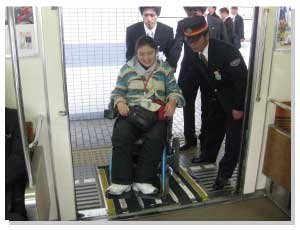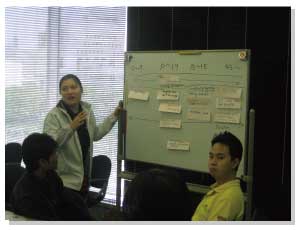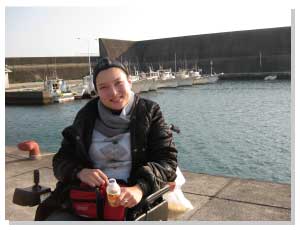- HOME
- Alumni News
- Seinep Dyikanbaeva (10th trainee)
- Seinep's Final Report
Seinep's Final Report
Everyone is different, yet everyone is the same!
Kyrgyz and my life
In Kyrgyz, I was studying at a university and working at a NGO for children with disabilities at the same time. Kyrgyz is not yet barrier-free, so I had never lived alone before coming to Japan. If I wanted to go out, I had to have help of family or friends. I wanted to go to so many places by myself, so this was often a problem. In Kyrgyz, people with disabilities cannot go out very much. It is especially difficult for people with multiple disabilities. They cannot study, nor work. They cannot leave home, they do not go outdoors. They just watch the same television day after day. It is truly very sad.
Getting used to life in Japan
1. Language
When I arrived in Japan I had no knowledge of the Japanese language. I tried very hard to study it but it did not improve very quickly. I would go to a supermarket, but as I could not figure out what was what so I would ask the staff. But they did not understand what I was trying to say—and simply, smiled. I often ended up buying the same things twice.
2. On living alone
It is very difficult for people with disabilities to live alone in Kyrgyz, but it is possible in Japan. It is great fun to live alone. If it gets difficult there is a helper system, so it is possible for people with severe disabilities to live alone here.
I experienced an electronic wheelchair for the first time in my life in Japan. It was very convenient. I also went on a train by myself for the first time. It was scary at first, as there are no trains in Kyrgyz and have never experienced before. Since Japan is barrier-free, I could go anywhere I wanted on my own by train in an electronic wheelchair. In Japan I see so many people with disabilities everywhere, but in Kyrgyz, none…. it is very nice in Japan.

Home Stay
My host-mother for the home stay program in Kochi Prefecture was Ms Keiko Higuchi. The host-father was Mr. Hideo Kondo. They both had disabilities. It was a great experience. They took me to watch a circus and to eat several restaurants. We also went to see the ocean every day, as they knew there is no ocean in Kyrgyz. Ms Higuchi’s house was barrier-free so it was a great opportunity to see how a person with a disability moved around. It was such a wonderful experience and I would like to say heartfelt words of thanks to my host family.
My studies in Japan
1. Independent living of people with disabilities
I went to Independent Living “MUCHU” Center in Osaka for my training. It was very hard. I could only understand simple Japanese, but the Japanese used in the individual training was extremely difficult. I did not know much about Japanese culture either. Japanese people do not clearly speak their minds, they use euphemism. For example, the members of staff would ask, “will you eat alone tonight?”—whose true meaning was “would you like to join us for dinner? As I did not get this, I always answered “yes, I will eat alone.”
As I did not understand Japanese too well, my brain had to work to the full during the training. I always went home at 6pm as it was so exhausting. Everyone seemed very surprised because they wanted to have dinner with me, or hang out with me, but I never thought they were thinking like that. There were so many misunderstandings at the beginning, which made matters so challenging.
Finally I went back to Tokyo for the ski training, and discussed these issues with Ms Okuhira and Ms Nasu. I also thought by myself about how to resolves this situation, or to make the training a more fun experience. I went back to MUCHU and worked harder. The staff at MUCHU also tried to help me understand, by drawing pictures, making their speeches simpler, or by using body language. I became friends with them, and from there had many happy experiences.

2. Rights of people with disabilities and welfare system
At Japan National Assembly of Disabled People’s International (DPI), I learned about intellectual disabilities—about people who did not have physical disabilities, yet had a hard time. I was not aware of these disabilities before. It was all new to me. I also learned about lobbying and advocacy. It was a good experience.
3. Training for children with disabilities
I learned about children with disabilities, and attended parents’ meetings and rehabilitation programs for the children.
There is a good system of “maternal and child health handbook” in Japan. A mother receives a book of tickets when she obtains the handbook. She can have 14 health check-ups using the tickets. If problems are found, she can go for further check-ups. The handbook is supposed to contain information about the development of the child, between age 0 and 6. If the child has a disability or illness, the mother can consult with physicians and other sources and they in turn will tell the mother where to go or if rehabilitation programs are available.
I erred a lot, I learned a lot
1. Now I am free
Now I have freedom.
Now I can go anywhere by myself in a wheelchair.
Now I can go shopping by myself.
Now I can get on the train by myself.
Now I can live by myself.
2. What became clear to me in Japan
My idea of leadership changed greatly. Before coming to Japan, I was thinking that a leader was someone who was strong, who could do everything well. Now, after the training, I think of a leader as someone who can work together with his or her network of people and accomplish goals.
It also became clear to me that every single person counts. Everyone has different roles, different people get together to form a team. There are things people cannot do if they are on their own, but as a team, anything is possible. In a team, everything feels kinder, faster and more fun. A team brings better results. This was something I learned at the Independent Living “MUCHU” Center. Everyone is different, yet everyone is the same.
My goals back home
When I go back to Kyrgyz, I want to accomplish three things.
First, I want to establish a center for independent living. I would like to give a presentation first and tell people of Kyrgyz about independent living. I would then like to prepare the ground to establish the center with my peers. I would like to establish the center within the next two years.
Second, I would like to work for lobbying and advocacy. I would like to develop a movement to protect and legislate for the rights of people with disabilities and create a barrier-free environment. I would like to work in collaboration with various organizations.
Finally, I would like to support children with disabilities. If there is a maternal and child health handbook in Kyrgyz, it will give a lot of energy to both mothers and children. It will also help to spot children with disabilities faster. So I would like to introduce the health handbook system in Kyrgyz.
Gratitude
I would like to give words of thanks to everyone at the Duskin AINOWA Foundation and Japanese Society for Rehabilitation of Persons with Disabilities, for giving us an opportunity to study in Japan. I would also like to thank everyone at the training destinations, for teaching me new ways to change society. Thank you ever so much.





